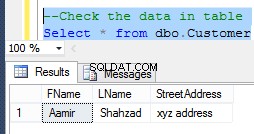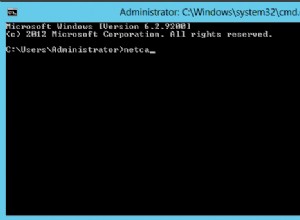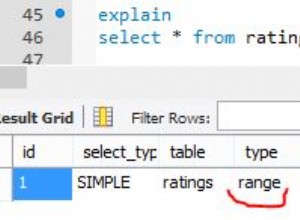Usa coalesce() y una subconsulta
select id, o1,
CASE WHEN o2!=o1 THEN o2 END o2,
CASE WHEN o3!=o2 THEN o3 END o3
FROM
( select id, coalesce(org1,org2,org3) o1,
coalesce(org2,org3) o2,
org3 o3 from tbl ) t
ACTUALIZAR
La respuesta anterior no fue suficiente, como descubrió R2D2 con mucha razón. Desafortunadamente, no puede hacer CTE en mysql, así que creé una vista en su lugar (amplié el ejemplo con otra columna org4 ):
CREATE VIEW vert AS
select id i,1 n, org1 org FROM tbl where org1>'' UNION ALL
select id,2, org2 FROM tbl where org2>'' UNION ALL
select id,3, org3 FROM tbl where org3>'' UNION ALL
select id,4, org4 FROM tbl where org4>'';
Con esta vista ahora es posible hacer lo siguiente:
SELECT id,
(select org from vert where i=id order by n limit 1) org1,
(select org from vert where i=id order by n limit 1,1) org2,
(select org from vert where i=id order by n limit 2,1) org3,
(select org from vert where i=id order by n limit 3,1) org4
FROM tbl
No es hermoso, pero hace el trabajo, mira aquí:SQLfiddle
entrada:
| id | org1 | org2 | org3 | org4 |
|----|--------|--------|---------|--------|
| 1 | HR | (null) | Staff | IT |
| 2 | (null) | IT | Dev | (null) |
| 3 | (null) | (null) | Finance | HR |
salida:
| id | org1 | org2 | org3 | org4 |
|----|---------|-------|--------|--------|
| 1 | HR | Staff | IT | (null) |
| 2 | IT | Dev | (null) | (null) |
| 3 | Finance | HR | (null) | (null) |




